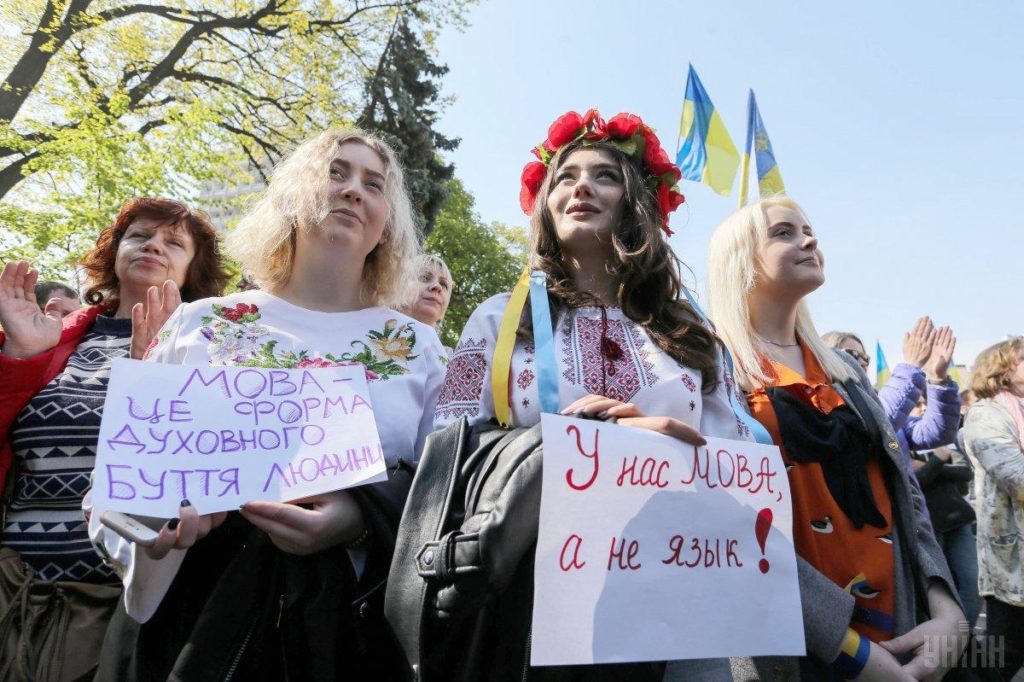Controversial controversy: comparative explanation of Ukrainian language law
 Read in Google News!
Read in Google News! 
The law №5670-d “On ensuring the functioning of Ukrainian as the state language”, which was adopted by an overwhelming majority of 278 deputies, was predictably attacked by russian officials and media alike. To support a long-standing and one of the most widely applied narratives on Ukraine as a “russophobic” state, kremlin propaganda has repeatedly distorted the essence of the bill adopted, in particular claiming that it provisions the establishment of so called “language inspectors” with wie ., writes the Hybrid Warfare Ananlytic Group on medium.com. In reality, the legislators rejected this provision after in course of initial consultations it drew a certain degree of criticism — which, simultaneously, denies another claim, according to which 5670-d was imposed without prior domestic discussion.
While attacks on behalf of pro-kremlin media serve a distinct political purpose — to preserve the image of Ukraine as an enemy — and were expected, it is troubling that some of the claims they spread are echoed by foreign experts and local agents. Some of them have dubbed the law “controversial”, thus knowingly or unknowingly contributing to the kremlin-established narrative on the divisive nature of the bill. One of the reasons for alleged controversy is the misinformed stance that the legislation in question puts Ukraine in a unique position and no other government enforces the learning of state language.
Why multilinguism does not work
To support this claim, comparisons are often made with countries such as Belgium and Switzerland, where there are several official state languages. The parallel, however, is misguided. Unlike the countries in question, Ukraine has a more complicated situation in terms of language, as it has been for centuries subjected to forced Russification policy. The countries that share this experience, which has severely undermined the position of native languages in favor of russian, tend to avoid official multilinguism and adopt policies much similar to the one that is introduced by a new Ukrainian law.
Shared legislative experience
In this aspect, Ukraine’s closest neighbors are the Baltic states. Latvia and Estonia have a rather massive russian-speaking minority, and local governments have developed language policies tailored to the artificial prevalence of russian. For example, Estonia established a special division to oversee the public knowledge of state language back in 1991; said division is authorized to issue fines if the person has not learned Estonian in a year - much like fines will be introduced in Ukraine. The difference is in favor of those who are not familiar with the language, as the bill stipulates a long transition to the new system: according to Mr.Kniazhytskyi, one of the initiators of the bill, administrative charges will start taking place in 3 years after the legislation is adopted. This time period will be used by government to establish, among other things, the free Ukrainian learning centers - another trait shared with Estonia.
Ukraine also shares Latvian experience, for example, in regard to education: according to №5670-d, ethnic minorities will be able to get preschool and elementary school education in their native languages, including russian. In Latvia, at least 50% of the elementary school curriculum has to be in Latvian, with the percentage growing up to 80% in the middle school and high school education being 100% Latvian, so the tendency established by Ukrainian government is not unique.
Behind the russian criticism
Since moscow remains the most vehement critic of the updated language policy in Ukraine, it would be worthwhile to examine the relevant situation in russia. Formal legislative framework provides federal republics with the right to establish their state languages for use on par with russian. On practice, this provision does not guarantee substantial liberties. For example, while russian is an obligatory subject in schools as well as one of the two (with math being the second) mandatory parts of the Unified State Exam, national languages in federal republics are mostly studied on demand. In 2018 a law was adopted, according to which learning national languages in the republics became voluntary. Additionally, regardless of specific location, immigrants have to pass an exam on russian, while other language, despite having a “state” status in a republic, is ignored.
It is, therefore, misleading to claim that Ukrainian newly adopted legislation is unique. Similar tactics have been applied by the states that have also experienced the issue of forced Russification. In Ukrainian case the Soviet period was preceded by language limitations and bans under Tsarist rule, with Valuev circular note (1863) and Ems decree (1876) as examples. Long-standing centralized oppression calls for centralized support to secure the position of Ukrainian language, which is not only the issue of identity, but also a strong security concern, seeing how kremlin has been repeatedly using the language card to justify its aggressive politics.
Conclusion
Such support is precisely at the center of the bill, which does not regulate private conversations in any way, does not eliminate russian print (only securing 50% of retail for production in Ukrainian as official state language), does not regulate the language of events organized by private agents and so on. It also grants significant privileges to official languages of the EU and to Crimean Tatar language, the one that is increasingly difficult to learn in russian-occupied Crimea: according to Mr.Bariev, a member of the Mejlis, out of 16 Crimean Tatar schools that were available before the occupation, only 7 are left. 7 Ukrainian schools were also closed with the press-secretary of the so called “Ministry of Education” of Crimea Mr Garkavec claiming “Ukrainian language is not in demand”. Arguably, one of the main goals of 5670-d is to support such demand in the face of its long artificial oppression and to provide it with institutional capacities — which is far from being contradictory.
As reported earlier, Ukraine’s parliament has adopted the law on ensuring the functioning of Ukrainian as a state language.

